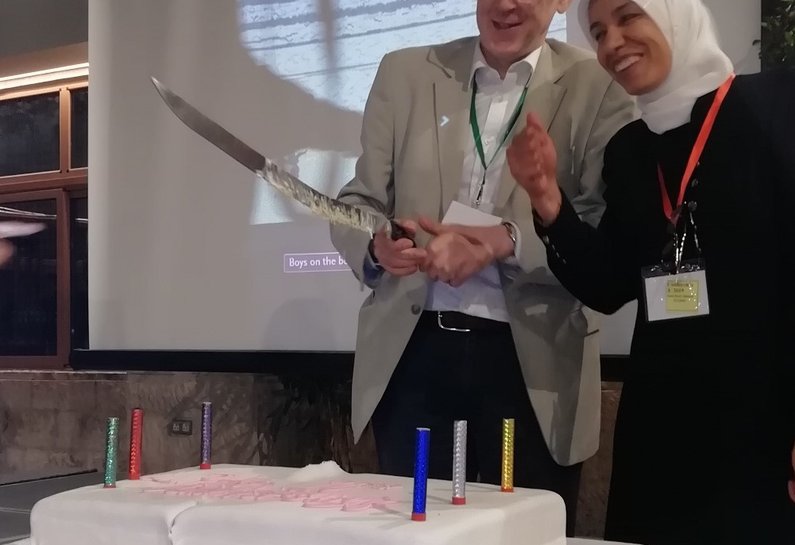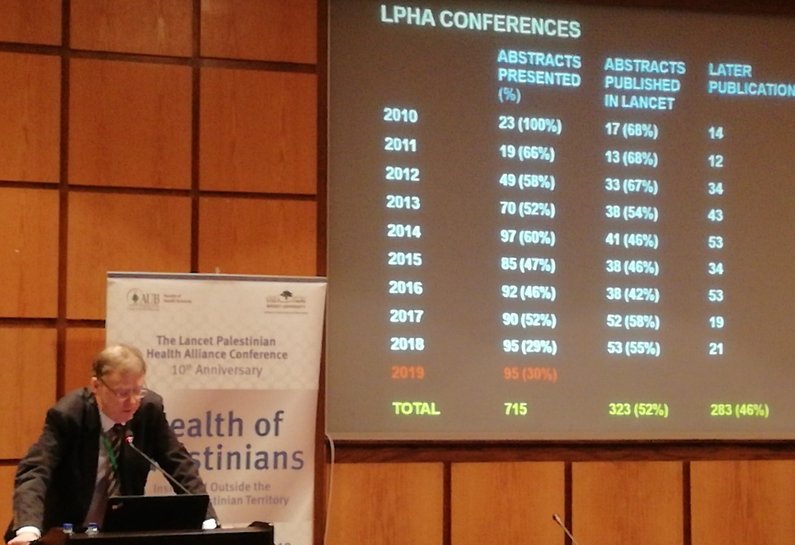10th Conference of the Lancet Palestinian Health Alliance

By Professor Graham Watt, MD FRCGP FRSE FMedSci CBE, Emeritus Professor, General Practice and Primary Care, University of Glasgow
Ten years on from a series of articles in The Lancet in 2009 on Health in the Occupied Palestinian Territory (oPt), the conference celebrated a decade of increasing capacity to describe and explain the health and health care of Palestinians, not only in the oPt but also Lebanon, Jordan and Syria.
Having hosted launch events in London for the 2009 Lancet series, MAP has continued to support the LPHA, especially its work inbetween conferences involving research training, preparations for publication and conference planning.
Having summarised the research literature on Health in Palestine for the 2009 series, it was felt that time would have to pass before there would be sufficient new research to justify a conference. As it turned out, a conference has been held every year for 10 years and is now an annual event, regularly attracting over 300 abstract submissions and accepting about 100 for oral or poster presentation. The 95 abstracts accepted for the recent Amman conference involved over 500 authors. Half of the first authors were women. 29% of presenters were under 30, 36% in their 30s while 35% were over 40.

The presenters at Amman came mainly from the West Bank and Gaza, with smaller numbers from Lebanon and the region. Others came from 13 overseas countries, but most of these were Palestinians studying Palestine from abroad.
Overall there were 38 studies of situations in Gaza, 29 in the West Bank (including five from East Jerusalem), seven in both the West Bank and Gaza, six were UNRWA-wide, six from Lebanon and three from Jordan. The Islamic University of Gaza and Al Quds, Birzeit and An-Najah Universities continue to be strongly represented. Local and regional organisations included 18 abstracts from UNRWA, nine from the Ministry of Health, five from WHO, three from the National Institute of Public Health and others from hospitals, NGOs, societies and institutions.
The oral presentations in 2019 featured conference sessions on: the Great March of Return; the social and political determinants of the health of children, adolescents and young adults; appraisal of clinical and survey instruments; conflict and health; mental health; cancer survival, risk and experience, including pain control; and a situation report from UNRWA.
In addition to research studies describing the consequences of military attacks and economic blockade in Gaza, military occupation in the West Bank and the lack of civil status for Palestinian refugees in Lebanon, many studies have focused on the fragmented and inefficient nature of health systems for Palestinians in the West Bank, Gaza and Lebanon. A very important development has been the application of evidence-based medicine in Gaza, with over 100 audit studies now completed.
Over 10 years, 715 abstracts have been accepted for presentation at LPHA conferences, 55% of which have been published in the Lancet (after further peer review) and 46% have led to further publication as scientific papers, reports and university theses.
A great strength of the LPHA is that there are no specialist audiences. Everybody listens and is interested in everything. It is all part of Palestinian experience. A community of colleagues has been created, many of them young with long careers ahead, adding to the Palestinian narrative and spreading it abroad in ways which are only possible using scientific method. They are passionate but disciplined in terms of what their data allow them to say. That is an existential force, which is getting stronger.
To read the abstracts from the 2018 conference, published in 2019 click here. The 2009 to 2017 series can be read here.

